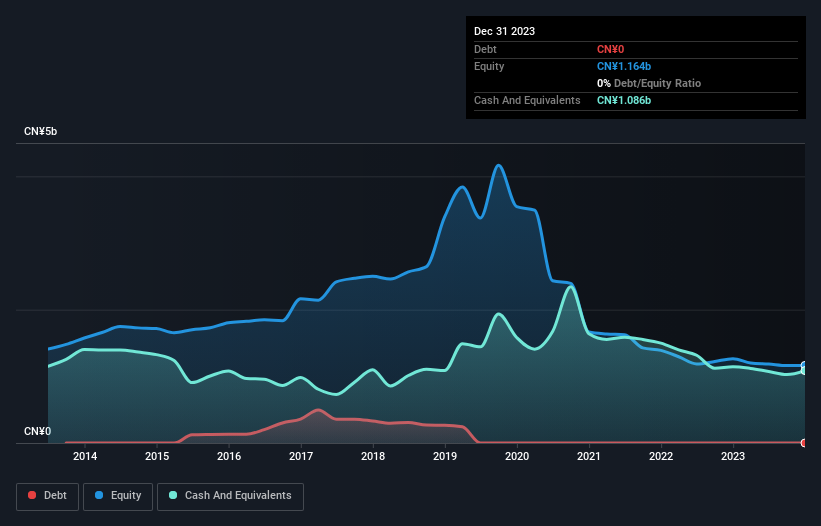- United States
- /
- Interactive Media and Services
- /
- NYSE:FENG
We're Not Very Worried About Phoenix New Media's (NYSE:FENG) Cash Burn Rate
Just because a business does not make any money, does not mean that the stock will go down. For example, although Amazon.com made losses for many years after listing, if you had bought and held the shares since 1999, you would have made a fortune. But the harsh reality is that very many loss making companies burn through all their cash and go bankrupt.
So should Phoenix New Media (NYSE:FENG) shareholders be worried about its cash burn? In this article, we define cash burn as its annual (negative) free cash flow, which is the amount of money a company spends each year to fund its growth. The first step is to compare its cash burn with its cash reserves, to give us its 'cash runway'.
Check out our latest analysis for Phoenix New Media
When Might Phoenix New Media Run Out Of Money?
A cash runway is defined as the length of time it would take a company to run out of money if it kept spending at its current rate of cash burn. In December 2023, Phoenix New Media had CN¥1.1b in cash, and was debt-free. In the last year, its cash burn was CN¥71m. That means it had a cash runway of very many years as of December 2023. Even though this is but one measure of the company's cash burn, the thought of such a long cash runway warms our bellies in a comforting way. You can see how its cash balance has changed over time in the image below.

How Well Is Phoenix New Media Growing?
Happily, Phoenix New Media is travelling in the right direction when it comes to its cash burn, which is down 80% over the last year. But it was a bit disconcerting to see operating revenue down 12% in that time. We think it is growing rather well, upon reflection. In reality, this article only makes a short study of the company's growth data. This graph of historic earnings and revenue shows how Phoenix New Media is building its business over time.
How Easily Can Phoenix New Media Raise Cash?
We are certainly impressed with the progress Phoenix New Media has made over the last year, but it is also worth considering how costly it would be if it wanted to raise more cash to fund faster growth. Issuing new shares, or taking on debt, are the most common ways for a listed company to raise more money for its business. One of the main advantages held by publicly listed companies is that they can sell shares to investors to raise cash and fund growth. By comparing a company's annual cash burn to its total market capitalisation, we can estimate roughly how many shares it would have to issue in order to run the company for another year (at the same burn rate).
Phoenix New Media's cash burn of CN¥71m is about 39% of its CN¥183m market capitalisation. That's fairly notable cash burn, so if the company had to sell shares to cover the cost of another year's operations, shareholders would suffer some costly dilution.
Is Phoenix New Media's Cash Burn A Worry?
On this analysis of Phoenix New Media's cash burn, we think its cash runway was reassuring, while its cash burn relative to its market cap has us a bit worried. While we're the kind of investors who are always a bit concerned about the risks involved with cash burning companies, the metrics we have discussed in this article leave us relatively comfortable about Phoenix New Media's situation. On another note, Phoenix New Media has 3 warning signs (and 2 which are significant) we think you should know about.
Of course, you might find a fantastic investment by looking elsewhere. So take a peek at this free list of companies insiders are buying, and this list of stocks growth stocks (according to analyst forecasts)
New: Manage All Your Stock Portfolios in One Place
We've created the ultimate portfolio companion for stock investors, and it's free.
• Connect an unlimited number of Portfolios and see your total in one currency
• Be alerted to new Warning Signs or Risks via email or mobile
• Track the Fair Value of your stocks
Have feedback on this article? Concerned about the content? Get in touch with us directly. Alternatively, email editorial-team (at) simplywallst.com.
This article by Simply Wall St is general in nature. We provide commentary based on historical data and analyst forecasts only using an unbiased methodology and our articles are not intended to be financial advice. It does not constitute a recommendation to buy or sell any stock, and does not take account of your objectives, or your financial situation. We aim to bring you long-term focused analysis driven by fundamental data. Note that our analysis may not factor in the latest price-sensitive company announcements or qualitative material. Simply Wall St has no position in any stocks mentioned.
About NYSE:FENG
Phoenix New Media
Provides content through an integrated Internet platform in the People’s Republic of China.
Flawless balance sheet with low risk.
Similar Companies
Market Insights
Community Narratives




